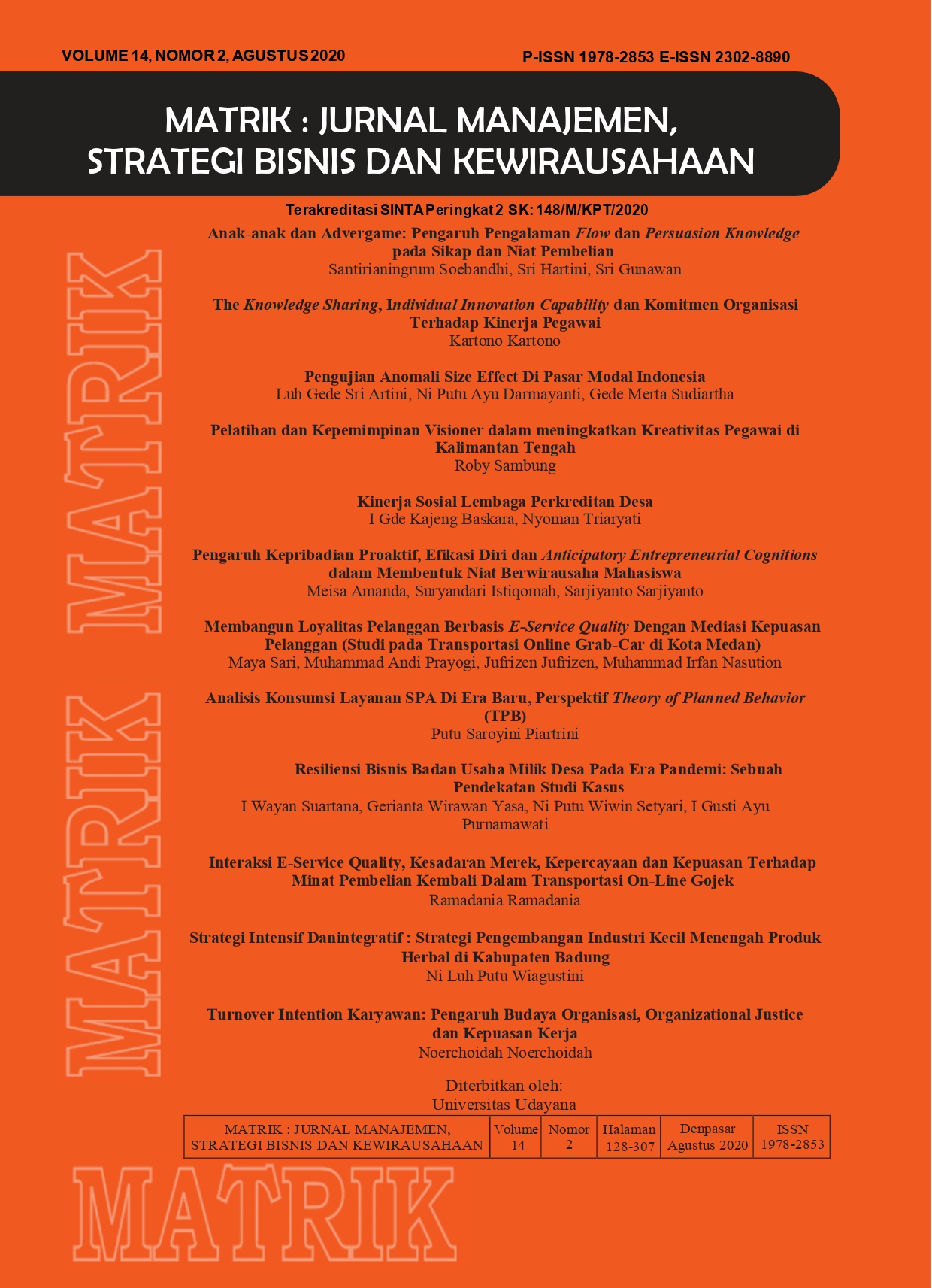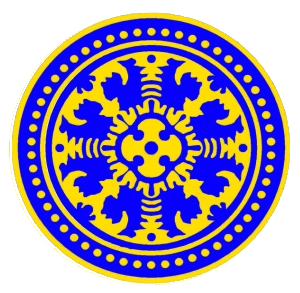Pelatihan dan Kepemimpinan Visioner dalam meningkatkan Kreativitas Pegawai di Kalimantan Tengah
Abstract
The aim of this paper to explain the influence of leadership training in visionary leadership, on the creation of employee creativity, and the role of sharing knowledge as the moderating variable. The respondents consist of 50 echelon III officials from 30 government organizations of Central Kalimantan taking part in the new pattern of leadership training and education. Variant base SEM is used to analyze the data. The results show visionary leadership mediates the relationship between leadership training and employee creativity. Knowledge sharing is proven to moderate the relationship between visionary leadership and employee creativity. This research contributes to the development of leadership theory in government organizations, this shows that leaders with a visionary leadership style are able to increase employee creativity in the workplace, but it depends on the knowledge sharing behavior of the leader
Downloads
References
Choudhary, A. I., Akhtar, S. A., & Zaheer, A. (2013). Impact of transformational and servant leadership on organizational performance: A comparative analysis. Journal of Business Ethics, 116(2), 433–440.
Darmawan, D. ., Djumadi, & Paselle, E. (2013). Peningkatan Kemampuan Manajerial Dalam Memacu Kinerja Pegawai Sekretariat Daerah Kabupaten Kutai Kartanegara. EJournal Administrative Reform, 1(3).
Day, D. V., Fleenor, J. W., Atwater, L. E., Sturm, R. E., & McKee, R. . (2014). Advances in leader and leadership development: A review of 25years of research and theory. The Leadership Quarterly, 25(1), 63–82.
Ding, D., Lu, H., Song, Y., & Lu, Q. (2012). Relationship of Servant Leadership and Employee Loyalty: The Mediating Role of Employee Satisfaction. IBusiness, 04(03), 208–215. https://doi.org/10.4236/ib.2012.43026
Ellen, M. G., Einarsen, S., & Mykletun, R. (2012). Creative leaders promote creative organizations. International Journal of Manpower, 33(4), 367–382.
Ferdinand, A. (2014). Metode Penelitian Manajemen, Pedoman Penelitian untuk Penulisan Skripsi, Tesis dan Disertasi Ilmu Manajemen. Edisi Lima. Badan Penerbit Universitas Diponegoro, Semarang.
Gagné, M. (2009). A model of knowledge sharing motivation. Human Resource Management, 48(4), 571–589.
Gemino, A., Reich, B. H., & Sauer, C. (2015). Plans versus people: Comparing knowledge management approaches in IT-enabled business projects. International Journal of Project Management, 33(2), 299–310.
Getha-Taylor, H., Fowles, J., Silvia, C., & Merritt, C. . (2015). Considering the effects of time on leadership development: A local government training evaluation. Public Personnel Management, 44(3), 295–316.
Ghozali, I., & Latan, H. (2015). Partial Least Square Konsep, Teknik dan Aplikasi menggunakan Program SmartPLS 3.0 Ed Ke-2. Badan Penerbit Universitas Dipenogoro, Semarang.
Hau, Y. S., Kim, B., Lee, H., & Kim, Y. G. (2013). The effects of individual motivations and social capital on employees’ tacit and explicit knowledge sharing intentions. International Journal of Information Management, 33(2), 356–366.
Hughes, R. L., Ginnett, R. C., & Curphy, G. J. (2012). Leadership Enhancing The Lessons of Experience (Leadership Memperkaya Pelajaran dari Pengalaman). Edisi Tujuh. Salemba Humanika, Jakarta.
Jaiswal, N. K., & Dhar, R. L. (2017). The influence of servant leadership, trust in leader and thriving on employee creativity. Leadership & Organization Development Journal, 38(1).
Jing, F. F., & Avery, G. . (2016). Missing Links In Understanding The Relationship Between Leadership And Organizational Performance. The International Business & Economics Research Journal (Online), 15(3), 107.
Joris, V. der V. (2016). Change leadership and public sector organizational change: Examining the interactions of transformational leadership style and red tape. The American Review of Public Administration, 46(6), 660–682.
Jyoti, J., & Dev, M. (2015). The impact of transformational leadership on employee creativity: the role of learning orientation. Journal of Asia Business Studies, 9(1), 78–98.
Kucharska, W., & Kowalczyk, R. (2016). Trust, Collaborative Culture and Tacit Knowledge Sharing in Project Management–a Relationship Model.
McCleskey, J. . (2014). Situational, transformational, and transactional leadership and leadership development. Journal of Business Studies Quarterly, 5(4), 117.
Mittal, S., & Dhar, R. L. (2015). Transformational leadership and employee creativity: mediating role of creative self-efficacy and moderating role of knowledge sharing. Management Decision, 53(5), 894–910.
Orazi, D. C., Turrini, A., & Valotti, G. (2013). Public sector leadership: new perspectives for research and practice. International Review of Administrative Sciences, 79(3), 486–504.
Park, J. G., & Lee, J. (2014). Knowledge sharing in information systems development projects: Explicating the role of dependence and trust. International Journal of Project Management, 32(1), 153–165.
Sarstedt, M., Ringle, C. M., & Hair, J. F. (2017). Partial least squares structural equation modeling. Handbook of Market Research, 1–40.
Sundiman, D., & Putra, S. S. (2016). Knowledge Management Role on Creating Service Excellence: Case Study on Building Materials Supermarket In the city of Sampit-Indonesia. In Proceedings of the The 11th International Knowledge Management in Organizations Conference on The Changing Face of Knowledge Management Impacting Society, 53.
Wang, S., & Noe, R. . (2010). Knowledge sharing: A review and directions for future research. Human Resource Management Review, 30, 115–131.
Wong, K. K. (2013). PLS-SEM Techniques Using SmartPLS. Marketing Bulletin. https://doi.org/10.1108/EBR-10-2013-0128
Zheng, W., Yang, B., & McLean, G. N. (2010). Linking organizational culture, structure, strategy, and organizational effectiveness: Mediating role of knowledge management. Journal of Business Research, 63(7), 763–771.
Zhou, L., Zhao, S., Tian, F., Zhang, X., & Chen, S. (2018). Visionary leadership and employee creativity in China. International Journal of Manpower, 39(1), 93–105.
 This work is licensed under a Creative Commons Attribution-ShareAlike 4.0 International License.
This work is licensed under a Creative Commons Attribution-ShareAlike 4.0 International License.

















